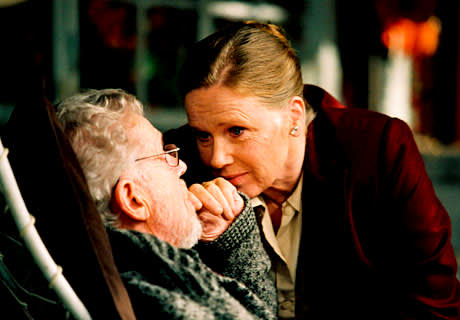In a parched summer of reality TV, it seems hard to imagine television that could match finely worked dialogue and powerhouse performances with the voyeuristic impulse to watch the ups and downs of someone else's marriage. Ingmar Bergman's 1973 television drama Scenes from a Marriage satisfied both urges, allowing us to eavesdrop on Marianne and Johan (Liv Ullman and Erland Josephson) as they navigated through stultifying happiness, infidelity, estrangement and divorce.
Saraband, which Bergman has said will be his final film, picks up the story of Marianne and Johan 30 years later. After many years with no contact, Marianne decides it is time to visit Johan at his summerhouse. While there, she witnesses and intervenes in the struggle between Johan's recently widowed son, Henrik, and his teenaged daughter, Karin. Henrik's ambitions for Karin's musical career collide with his unrelenting grief over his wife's death until his love becomes incestuous and smothering, and Karin must rebel.
The plot, as so often in Bergman's films, is secondary to the characters. Using the conceit of the "sarabande," an erotic dance for two, he creates a series of duets between the characters that come together to create a subtle and ambiguous meditation on the limitations, violence and resilience of love. Overwhelming the film is a powerful sense of loss. Henrik, grieving his wife's death, tells Marianne, "Darkness got darker, and light dimmed when Anna died." This grief actually stops the narrative, as we gaze at a photo of Anna for several unusually long but familiarly Bergman-esque seconds. Here the lines between film and reality blur, as the photo that we see again and again is actually of Ingrid, Bergman's wife who died a few years ago
Long-time Bergman collaborators Josephson, Ullman and Borje Alstedt (Henrik), produce performances as nuanced and moving as ever, as does newcomer Julia Dufvenius (Karin), and the film is up to Bergman's standard of carefully constructed scenes, beautifully shot, for the first time, in high definition. Although this is not in the league of Bergman's greatest films, it is a fitting end to a brilliant career. (Mongrel Media)
Saraband, which Bergman has said will be his final film, picks up the story of Marianne and Johan 30 years later. After many years with no contact, Marianne decides it is time to visit Johan at his summerhouse. While there, she witnesses and intervenes in the struggle between Johan's recently widowed son, Henrik, and his teenaged daughter, Karin. Henrik's ambitions for Karin's musical career collide with his unrelenting grief over his wife's death until his love becomes incestuous and smothering, and Karin must rebel.
The plot, as so often in Bergman's films, is secondary to the characters. Using the conceit of the "sarabande," an erotic dance for two, he creates a series of duets between the characters that come together to create a subtle and ambiguous meditation on the limitations, violence and resilience of love. Overwhelming the film is a powerful sense of loss. Henrik, grieving his wife's death, tells Marianne, "Darkness got darker, and light dimmed when Anna died." This grief actually stops the narrative, as we gaze at a photo of Anna for several unusually long but familiarly Bergman-esque seconds. Here the lines between film and reality blur, as the photo that we see again and again is actually of Ingrid, Bergman's wife who died a few years ago
Long-time Bergman collaborators Josephson, Ullman and Borje Alstedt (Henrik), produce performances as nuanced and moving as ever, as does newcomer Julia Dufvenius (Karin), and the film is up to Bergman's standard of carefully constructed scenes, beautifully shot, for the first time, in high definition. Although this is not in the league of Bergman's greatest films, it is a fitting end to a brilliant career. (Mongrel Media)
